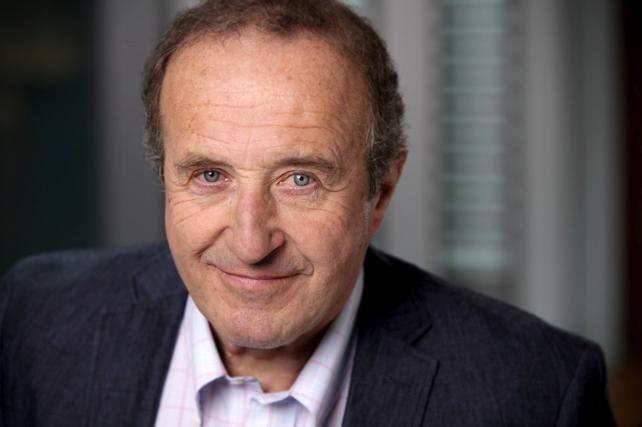No, it does not get funnier. Video via.
Last Sunday, an original comedy series about the inner workings of the Canadian government premiered on the CBC. Are you excited yet? No? Well, that’s OK. Most of the time there’s no point in paying attention to CBC's original programming unless your buddy landed a role as an extra. On the other hand, you may have seen one of the literally laughless advertisements for The Best Laid Plans during a hockey game or, I suppose, an episode of Dragon's Den. I learned of its existence because, every once in a while, the sometimes respectable CBC News Network dedicates five minutes to an execrable segment of “entertainment news,” essentially a nationwide platform for the CBC to speak in glowing, uncritical terms of whatever movie or musician happens to be popular on a given day; and while The Best Laid Plans will never be popular, they received an embarrassingly enthusiastic boost from their sister network anyway.
In The Best Laid Plans, Daniel Addison (Jonas Chernick) is a former speechwriter for the leader of the opposition (Mark McKinney) who quits his job because he's disillusioned with the political process, and because he catches his girlfriend, a fellow political aide, giving a blowjob to the party's energy critic. Addison—who is apparently a PhD in English literature—refers to this sexual double-cross as “lobbying the caucus.” Hilarious, right? Even the worst late-night jokes about Monica Lewinsky in 1998 hit harder than this. To think that a team of professional writers sat down and decided a line like this would make the final script is ridiculous. On top of that, the fact this scene made its way through production and editing and into the final cut should embarrass everyone involved.
During the two episodes that the CBC aired last week, Addison is blackmailed by the party leader's chief of staff into finding a candidate and organizing a campaign in an “unwinnable” riding, all while he begins his new job as a professor at the University of Ottawa. You'll notice that I haven't mentioned the party to which Addison belongs. This is because The Best Laid Plans is the type of wish-washy middlebrow garbage that's afraid to take sides. It's obvious that Addison's politics are to the left of centre, but God forbid the audience discovers if he skews Liberal or NDP. That sort of specificity may alienate viewers! Anyway, Addison's choice for a riding candidate is the colourful Scottish engineering professor (Kenneth Welsh) who is supposed to be funny—because he has an accent and he drinks a lot—but he is also supposed to be sweet because he made a water filtration device for poor First Nations people in his spare time.
That last plot point, where an elderly white intellectual deigns to make a charitable contribution to those who are less advantaged than himself, is representative of the most troubling aspect of the show. Actual First Nations people in Northern Ontario, who really are disadvantaged by Canadian politics, become a convenient plot point to demonstrate the compassionate qualities of an otherwise cantankerous character. This patronizing attitude toward anyone who isn't part of the academic or political circles of Ottawa has been infused into the show's fibre. Just look at this clip, in which “humour” is derived from the existence of young people because they are stupid and ignorant and they like pizza. Har har. The average voters of The Best Laid Plans' world are no different. They're just apathetic drones, waiting to be inspired by some centre-left sentiment delivered charismatically from an eccentric Scotsman.

Daniel Addison mimics the facial expression of just about every Canadian who has seen this dreck. Photo via.
If you're wondering why an out-of-control egomaniac like Ezra Levant can rant about the “elites” in the media (people who buy $7 lattes, apparently), it's because of the existence of shows like The Best Laid Plans, in which anyone who isn't an educated member of the political class is transformed into a caricature that delegitimizes their voice. Little Mosque on the Prairie insultingly treated small towners as racists, but it was OK because in the world of Little Mosque, racism wasn't a social and economic problem that manifested itself in systematic discrimination and prejudice, it was a harmless symptom of small-town eccentricity that could easily be cured by the tolerant values of a big city liberal. I'm sureThe Best Laid Plans will earn a small cadre of fans within Ottawa's political scene and Toronto's media players, but it won't play anywhere else, because it's not meant for anyone else. It's a circle jerk for everyone “in the know” and a big fuck you to everyone else.
In light of the rights to Hockey Night in Canada shifting to Rogers, much has been written in the last few months about the future of the CBC, with most coming to the consensus that the public broadcaster should stop chasing ratings with pale imitations of American programming. While I would love it if the CBC stopped producing crappy reality television shows and focused on programming of cultural relevance, as per its mandate, I'm not sure an argument as simple as a need for high ratings explains the poor quality of what does air on the CBC. It's not like there's any restriction against a show being both popular and, at least, watchable. But a show about Canadian parliament, like The Best Laid Plans, was never going to be a ratings success. It's also not a pale imitation of American programming like Mr. D or Cracked.
Instead, The Best Laid Plans is a poor attempt at distinctly Canadian programming that is absolutely sure to displease both general audiences and even halfway respectable media critics. Once upon a time, the CBC could deflect questions of low viewership by pointing to landmark shows like Kids in the Hall, Ken Finkleman's The Newsroom, Twitch City, or Slings & Arrows, but one has to look to a cheap cable show like Trailer Park Boys to find a memorable example of Canadian television from the last ten years.I don't know why The Best Laid Plans sucks so much. I suppose it's possible that the writers are just bad, but it's more likely that they're writing in a safe, inoffensive manner because that is the way they are expected to write. I couldn't say whether those expectations manifest themselves in explicit directions from the CBC's executive class or in a general attitude among creative employees that pushing the envelope is more trouble than it's worth, but something has to break, and hopefully the CBC breaks and fixes itself before the Conservatives use its crappy programming as an excuse to pull funding.
The Best Laid Plans is an example of the myopic culture of mediocrity that infects the CBC, in which quality standards are non-existent, risks are never taken, and no one bothers to criticize anything because hockey is the only reason anyone watches the damn channel in the first place. John Doyle is the only widely-read critic in the country who regularly covers Canadian television, and while he has problems with the CBC, he often handles any scripted Canadian content with kid gloves, as if it needs support to get any better. I don't think that's true. The CBC is like a friend with bad body odor, someone needs to tell him to use deodorant or he'll just keep on stinking up the room.










































